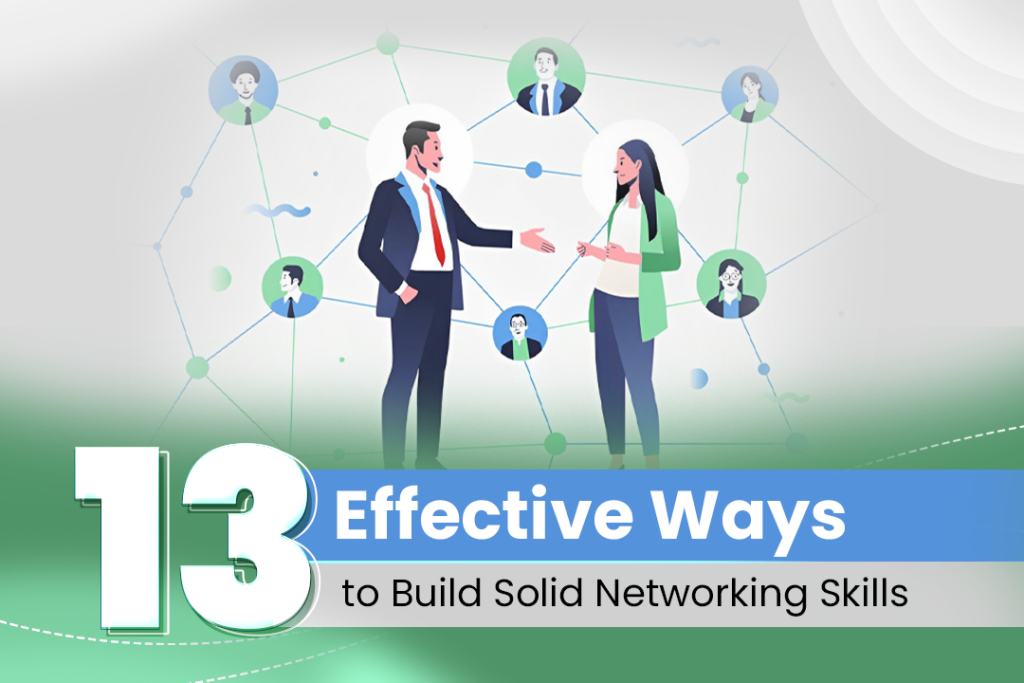
In today’s professional world, networking is crucial in establishing meaningful connections and gaining a competitive edge. To build valuable relationships and enhance the prospects of your business, it is vital to actively engage in networking practices daily.
Developing essential networking skills can help you navigate the landscape of professional relationships effectively. If you wish to know how to build networking skills, then here are a few of them that can assist you in improving your networking abilities. So what are you waiting for? Let’s get started.
13 Tips on How to Build Networking Skills
The question, ‘How to build networking skills?’ is crucial for personal and professional development. Networking is creating and maintaining relationships with people who can help you reach your goals, whether related to your career, business, or personal life.
Building a network of contacts gives you access to valuable resources, including information, advice, and job opportunities. Networking also allows you to develop your communication and interpersonal skills, which are essential for success in any field.

In today’s interconnected world, networking has become more critical than ever. It enables you to connect with people from diverse backgrounds and industries, expanding your knowledge and understanding of the world. Therefore, developing and enhancing your networking skills should be a top priority for anyone looking to achieve their goals and succeed in today’s competitive environment.
Here, we provide you with 13 key strategies for building networking skills that you can apply to lay a solid foundation for your journey. Let’s explore it:
1. Develop Proficient Communication Skills to Improve Interpersonal Interactions
An important strategy for building networking skills is to develop proficiency in effective communication. Effective communication involves articulating information and ideas lucidly and understandably while being receptive to different perspectives through active listening. This skill is essential in building and maintaining solid personal and professional networking relationships.
By communicating well, individuals leave a positive impression on others, promote goal-setting, and establish trust in interpersonal interactions.

To develop communication proficiency, individuals can take practical steps such as actively listening to others, improving language skills through writing and speaking, being mindful of non-verbal communication, maintaining composure, seeking feedback for improvement, and tailoring communication styles to fit specific audiences.
By incorporating these practices into their daily lives, individuals can enhance their communication abilities and facilitate successful interactions.
2. Hone Social Skills to Build Solid Relationships
Enhancing your interpersonal or social skills in networking means focusing on the qualities and abilities that enable effective communication with others. These characteristics include fundamental traits like empathy, the ability to build rapport, and the ability to earn trust, all of which contribute to establishing solid and long-lasting relationships.
Interpersonal skills are crucial in understanding how to build networking because they facilitate deeper connections beyond the mere purpose of networking. It allows for forming more meaningful relationships, better idea exchange, and opportunities for collaboration.

Several practices can improve your interpersonal abilities, such as developing empathy, building trust, asking open-ended questions, being authentic, seeking frequent input, networking regularly, and actively listening to people. By being sincere and empathetic, you can better understand others’ feelings and perspectives and establish positive relationships.
3. Learn the Art of Persuasion to Influence People & Drive Results
Persuasion is the ability to communicate effectively and influence others while networking. To succeed, it’s essential to make a positive first impression, earn the trust of others, and encourage them to take action. Developing persuasive skills can benefit you in numerous ways, such as building professional relationships, gaining referrals, and more.
Being persuasive is critical in achieving personal goals, pursuing new ideas, and cultivating enduring connections while networking. Persuasion can leave a lasting positive impression.

Several techniques can be employed to become persuasive. The first step is to understand the other person’s needs and interests and determine how you can fit into that picture. Once you’ve established a comfortable rapport, the next step is to express your ideas effectively. Additionally, using compelling arguments is essential, requiring attention to detail, fact-checking, and accurate calculations when presenting your proposal.
4. Negotiate Your Way Through Difficult Situations
Negotiation skills and effective communication techniques are essential for building and maintaining professional connections. As a persuasive individual, you can successfully close deals and find breakthroughs with people in your network by leveraging these skills.
Negotiation is a crucial aspect of networking. It enables you to establish long-term connections with like-minded individuals and achieve mutually beneficial outcomes. By honing your negotiation skills, you can gain more leverage and broaden your opportunities.

Pic Courtesy: Freepik
To improve your negotiation abilities, it’s essential to prepare thoroughly and understand the other party’s objectives and goals. Flexibility is also critical, as a willingness to make concessions can help you reach a mutually beneficial agreement. Finally, confidence in your negotiation skills is necessary to build and maintain professional relationships.
While developing these skills may take time and effort, they are crucial for creating and sustaining successful professional connections. Becoming an effective negotiator and communicator can unlock countless opportunities and establish yourself as a valuable network member.
5. Develop Collaborative Skills To Broaden Your Network
Collaboration in networking is essential for accomplishing daily tasks efficiently and effectively. When you work collaboratively with others, you build trust and rapport with them. This trust can lead to deeper connections and the potential for future collaboration.
Collaborating with others also exposes you to different perspectives, ideas, and working methods. This exposure can help you develop a broader understanding of the industry or field and identify potential opportunities for collaboration.

Pic Courtesy: Freepik
Additionally, collaboration involves sharing knowledge and resources with others. By doing so, you can expand your network and make new connections with people who have the resources or expertise you need.
It helps you work well with others, which can help you create a positive reputation in your industry or field. This positive reputation can lead to referrals and introductions to other professionals who may be interested in collaborating with you.
By honing one’s collaborative skills, individuals can establish meaningful relationships with colleagues in their network and work as a team towards shared objectives.
6. Acuminate Problem-Solving Skills to Address Any Potential Challenges
Problem-solving is the capacity to identify and address arising challenges while navigating them in the most effective and honest manner.
This ability is essential since it makes it easier to overcome obstacles while fostering stronger relationships and reaching your networking objectives. These abilities enable you to overcome challenges, cultivate connections, accomplish your purposes, and stand out. These become essential for effective networking.

Practice analytical skills, such as using reason and critical thinking to weigh your options and choose the best course of action, as well as creative skills. Devise novel ideas and solutions to problems that can positively affect the people you are networking with. Communication and teamwork also go hand in hand with these skills in solving problems and overcoming challenges.
7. Develop Adaptability to Different Situations to Demonstrate Your Flexibility
Adaptability effectively adjusts and responds to different circumstances, individuals, and places. It is a crucial aspect of networking since establishing strong connections with people is the ultimate goal.
When meeting new people, it becomes necessary to interact with individuals from various backgrounds, which demands the ability to adapt to diverse social cues, personalities, and other variables. Developing adaptability helps you become flexible and enhances your chances of building valuable connections.

To cultivate adaptability, one must be open-minded, observant, and receptive to learning. It is also crucial to stay true to oneself. These abilities enable an individual to approach every situation with an open mind, assimilate different viewpoints, note others’ behavior and communication styles, and use this information to adjust one’s approach accordingly.
8. Be Confident to Establish Yourself as a Leader
When you are confident in your abilities, people will trust your decisions and follow your lead. Confidence assures people that you know what you’re doing and that you can lead them towards a successful outcome.
Confidence can help you inspire trust, demonstrate competence, encourage action, build credibility, and foster resilience, all of which are essential for effective leadership.

Networking requires confidence as it empowers individuals to overcome fear, anxiety, and other negative emotions. Furthermore, it allows individuals to articulate their thoughts, values, and goals more effectively.
To cultivate confidence, it’s essential to establish practical goals, be authentic, and adequately prepare oneself. This approach helps individuals prepare to network with confidence. Understanding the event or organization helps set objectives and determine how to approach the occasion. Crafting an introduction and pitch is also critical to networking confidently, ensuring one is always in control and presenting one’s best self.
9. Practise Networking Etiquette to Build Solid Connections
Networking etiquette encompasses a set of unwritten standards of professional and social behavior that are considered appropriate and respectful in networking. These standards include punctuality, politeness, honesty, good listening skills, and humility, among other things.
Networking etiquette is important because it can create a supportive and productive environment for building business connections. Adhering to proper networking manners can leave a positive and lasting impression while contributing to a welcoming and respectful atmosphere.

Pic Courtesy: Freepik
To improve networking etiquette, one should prioritize punctuality, respect, honesty, boundaries, and professionalism. This involves being on time and avoiding tardiness, showing respect by actively listening and avoiding controversial topics, engaging in genuine conversations, recognizing others’ needs and time, and projecting professionalism by dressing appropriately and carrying business cards.
10. Always be Empathetic to Other’s Needs
Empathy is essential for networking because it enables you to connect with people on a deeper level and build more meaningful relationships. Empathy is the potential to understand other people’s feelings without judgment and involves being attuned to their emotions, perspectives, and experiences.
When you are empathetic, you can better understand the needs and desires of the people you are networking with. Doing this can help you tailor your approach and communication style to meet their needs better, leading to more successful networking interactions. For example, if you can sense that someone is feeling nervous or unsure about a situation, you can take steps to put them at ease and build their confidence.

Pic Courtesy: Freepik
Additionally, being empathetic can help you to build trust with the people you are networking with. Trust is the foundation for any solid relationship and is particularly important in professional networking. When people feel that you understand and care about their needs, they are more inclined to trust you and be willing to work with you in the future.
Finally, being empathetic can help you build a reputation as someone compassionate, understanding, and easy to work with. Embodying this quality can be a valuable asset in the professional world, as people are more likely to want to work with supportive and empathetic individuals.
To learn empathy, one must cultivate an open-minded attitude, put oneself in the other person’s shoes, show a genuine interest in their feelings and experiences, and practice mindfulness. Developing this ability requires time and effort, but with persistence, anyone can become more empathetic and build meaningful relationships with others.
11. Look Forward To Providing Value to Make It Worth Everyone’s Time
Creating value while networking means providing something worthy to others while building professional relationships. It involves offering support, insights, or expertise to help others achieve their goals or solve their problems. This can take many forms, including sharing helpful information, making introductions, offering feedback or advice, and providing referrals or recommendations.

The importance of providing value while networking cannot be overstated. By demonstrating your willingness to help others, you build trust and credibility, which can lead to new opportunities, partnerships, and collaborations. Additionally, providing value can help you stand out from others who are simply looking to take from their network without giving back.
Here are some ways to create value while networking:
- Share your knowledge and expertise: Share your insights on a topic or industry you have expertise in. Doing this can help others learn from your experience and perspective.
- Make introductions: Connect people who may benefit from knowing each other. Introduce people based on shared interests or goals.
- Offer to help: Volunteer your time and skills to help others with a project or challenge. Doing this can help build trust and rapport.
- Share resources: Share valuable articles, books, or other resources that may be helpful to others in your network.
- Provide feedback: Offer constructive feedback on a project or idea. Doing this can help others improve their work and show that you care about their success.
Creating value while networking requires a focus on others rather than yourself. Being generous with your time and expertise can build meaningful relationships that can benefit you and your network in the long term.
12. Be an Active Listener to Maintain Strong Networking Relationships
Listening skills are essential in networking as they involve:
- Actively paying attention to others.
- Understanding their needs and concerns.
- Responding appropriately and effectively.
- Effective listening requires focusing on the other person’s words, clarifying potential misunderstandings, and providing feedback.

These skills are critical for building and maintaining solid relationships in networking, as they demonstrate a genuine interest in and respect for the thoughts and opinions of others. To improve your listening skills, it is essential to actively listen during regular conversations, avoid interrupting, and seek clarification through questions. Additionally, seeking feedback from others can help you gauge your progress and identify areas for improvement.
13. Follow Up With Your Connections To Make Them Long Lasting
Following up with your connections in networking means regularly staying in touch with people in your professional network to build and maintain lasting relationships.
Doing so is imperative because networking is about meeting new people and nurturing and sustaining those relationships over time. Consistently following up with your contacts demonstrates your interest in maintaining the relationship and can lead to opportunities for collaboration, referrals, and valuable insights.

To maintain long-lasting relationships, one can send occasional emails or messages to check in, share relevant information, or offer assistance. It is also helpful to attend networking events, reach out to schedule a coffee or lunch meeting or connect on social media. Consistency is critical, so staying in touch regularly without overwhelming your contacts is essential.
By following up with your connections, you can build a strong network of professionals who can provide support, advice, and opportunities throughout your career.
How Can Eventible Help You?
Attending events can be a fantastic way to meet people from various fields and improve your networking skills. It also provides an excellent opportunity to meet individuals from successful businesses and startups. While online events are becoming more common, in-person events offer valuable networking opportunities.
Eventible is a B2B review website that provides various event options and reviews from experts, presenters, and attendees. It helps you make informed choices about which events to attend and make the most of your time. Overall, events offer a fantastic opportunity to connect with others and can benefit personal and professional growth.
Key Takeaway
Networking skills are essential for success in both personal and professional life. Building these skills requires practice, persistence, and a willingness to step outside your comfort zone. You can expand your network and create meaningful connections by attending events, joining groups, volunteering, and using online platforms. Remember to be authentic, genuine, and respectful in your interactions, and don’t be afraid to follow up with people you meet. With time and effort, you can develop strong networking skills that will benefit you throughout your life and career.




Comments are closed.